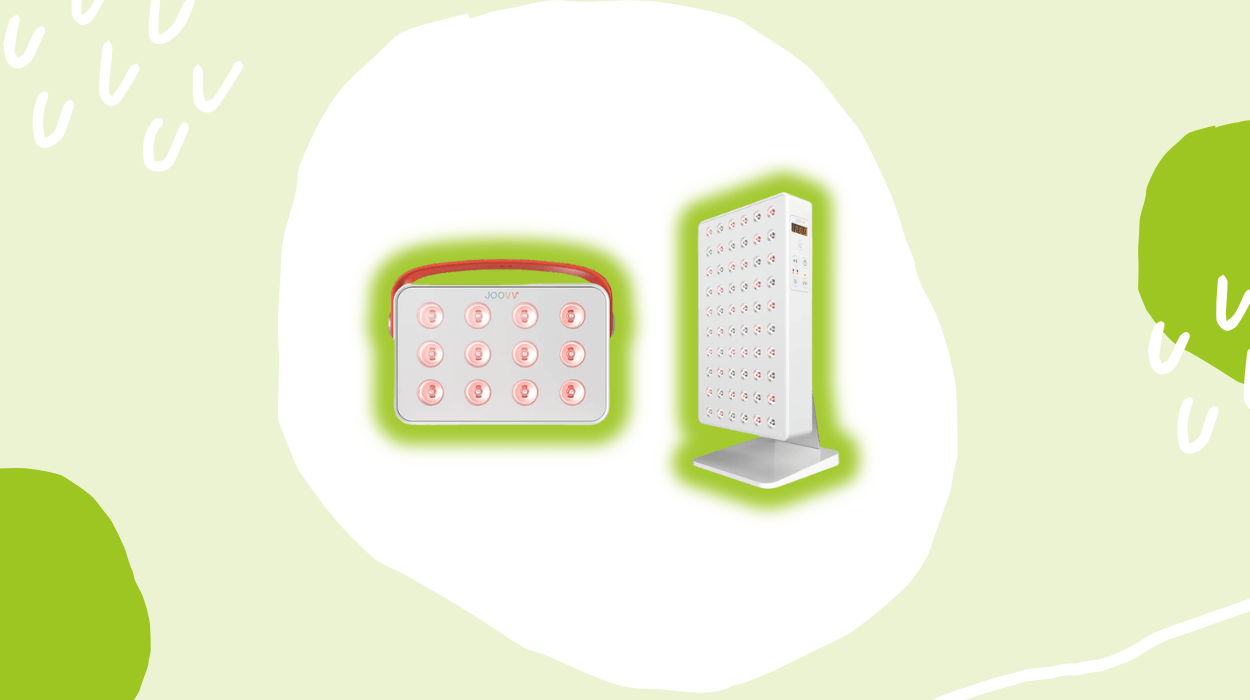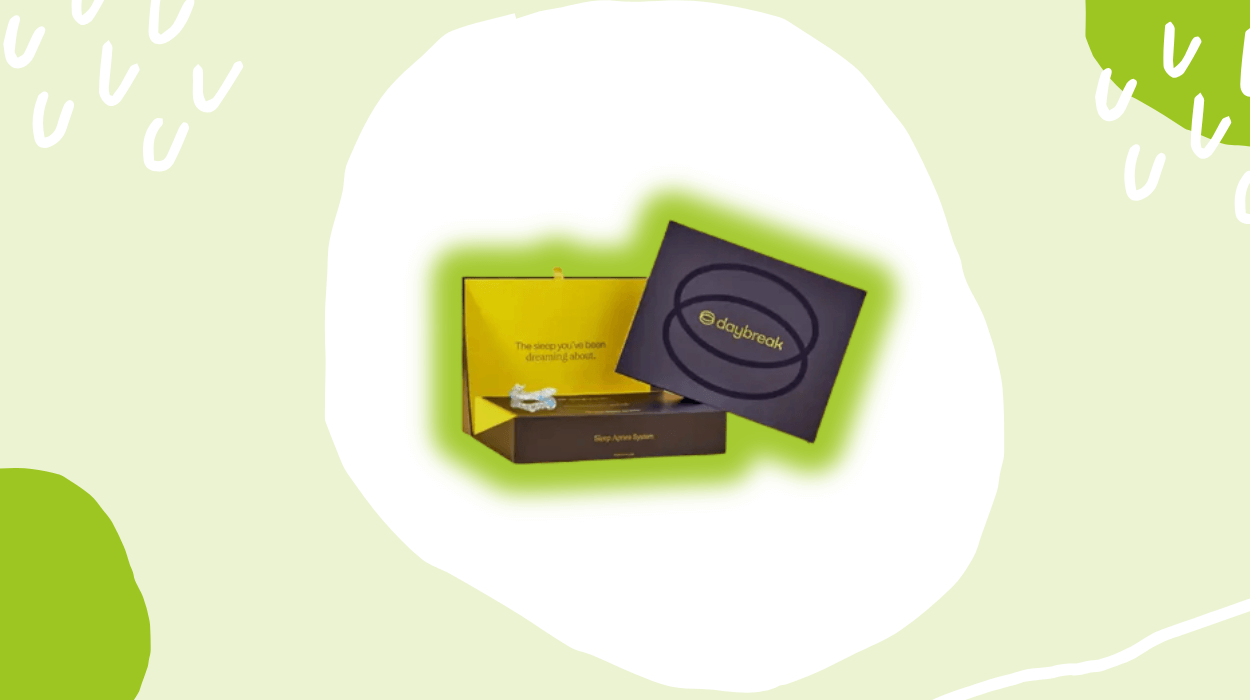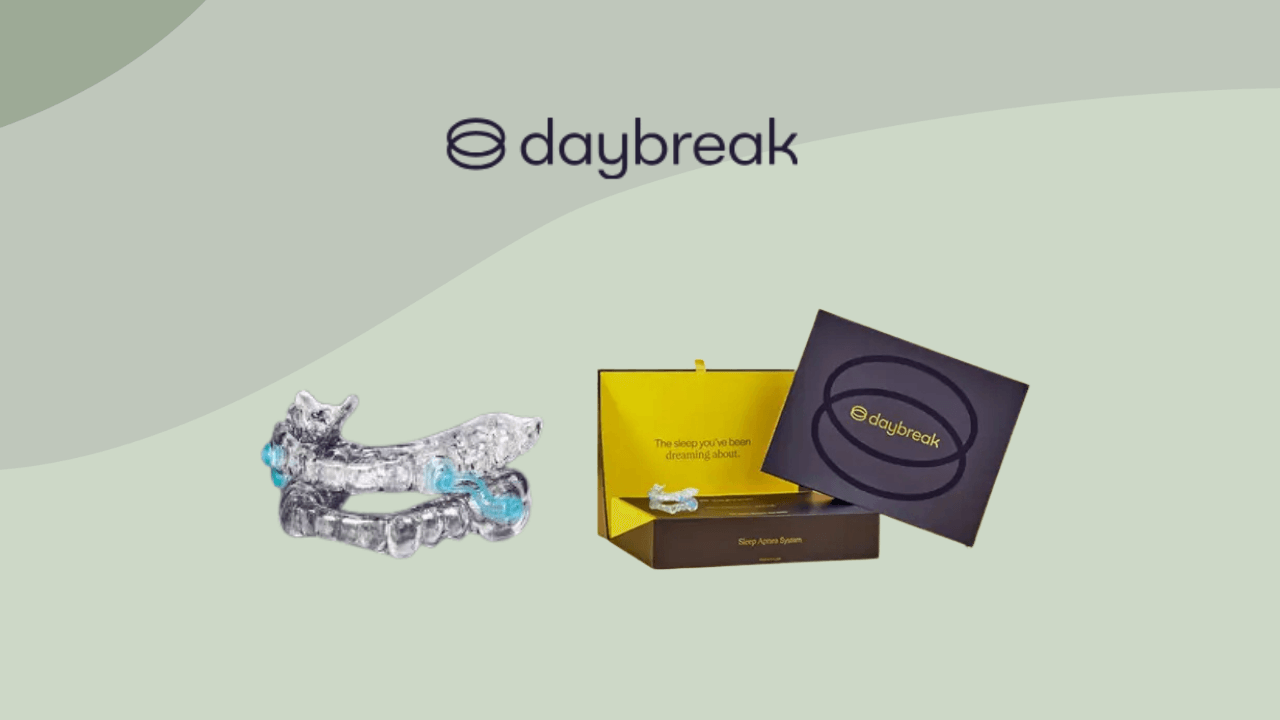

Daybreak is a sleep wellness brand that focuses on obstructive sleep apnea and providing customized support through its licensed clinicians and sleep specialists. The brand operates on a digital-first model and offers access to sleep apnea management.
The platform offers access to an at-home sleep test kit and virtual consultations with licensed clinicians, who may provide a custom mandibular advancement device to help adjust your jaw position and minimize sleep disruptions.
In this review, we discuss how the platform’s consultation and screening process works, including the comfort and efficacy of its devices and services. The review also explores how the brand’s offerings compare with other competitive sleep support brands and CPAP machines.
Daybreak positions itself as a remote at-home sleep support platform, which intends to make testing, diagnosis, and personalized care support for sleep apnea more accessible. The platform’s care system and devices are guided by Dr Martin Hopp, a reputable obstructive sleep apnea expert, and Dr Peter Balacky, an expert in jaw advancement surgery.
The process requires you to take an At-Home Sleep Test, under which a compact monitor is wrapped around your finger that checks for your sleep patterns. Such data is then reviewed by licensed clinicians from the brand, who help confirm the diagnosis of sleep apnea and provide a custom-fit Daybreak Device to tackle sleep discomfort.
According to its official website, the At Home Sleep Test is FDA-cleared and maintains 98% accuracy in sleep apnea detection. Post-diagnosis, the brand provides impression materials with step-by-step video instructions to take a mold of your teeth. Once you send the impressions, it typically takes the brand around 2–3 weeks to make a custom-fit device based on your impressions.

The At-Home Sleep Test kit offers a compact, wireless finger-worn monitor designed to record vital physiological signals while you sleep. It pairs with a dedicated mobile app and automatically sends your overnight data to Daybreak’s medical team for interpretation, allowing licensed clinicians to confirm the diagnosis of sleep apnea.
As part of the kit, the wireless monitor arrives ready to use and works throughout the night with no wires or complex setup. Once activated, the monitor continuously measures indices like oxygen desaturation events, heart rate responses to breathing pauses, and peripheral arterial tone changes, signals that correlate strongly with obstructive sleep apnea events.
The manufacturer claims that the At-Home Sleep Test kit is FDA-cleared and is around 98% accurate in detecting sleep apnea. The At-Home Sleep Test kit is typically available in the retail range of $155–$165 from its official website.
After the licensed clinicians confirm a sleep apnea diagnosis, the brand sends an impression kit with clear instructions and a step-by-step video. You are required to create a mold of your teeth at home and return it for fabrication. The brand then customizes the Daybreak device to your specific bite and jaw structure using lightweight materials.
The device works on the mechanism of mandibular advancement, where it gently positions your lower jaw forward to help maintain an open airway. Such forward positioning also raises natural tension in the genioglossus muscle, the primary muscle that stabilizes your tongue. The activation could make your tongue less likely to fall backward during sleep, which may improve airflow and reduce oxygen drops typically associated with sleep apnea events.
According to its official site, the Daybreak device is manufactured in an accredited dental lab, aligning with established clinical standards for oral appliances used in sleep apnea care. However, the manufacturers highlight that you might experience increased tenderness in the teeth or jaw, increased salivation, and soreness in the jaw during initial use.
Daybreak claims that its At-Home Sleep Test and custom-fit devices are eligible for insurance coverage, which may help reduce out-of-pocket costs. After completing the home testing process and receiving a doctor-reviewed diagnosis, the brand works with your insurance provider to check benefits and submit claims on your behalf.
The brand also highlights that major health insurance providers, including Aetna, Cigna, United Healthcare, and EmblemHealth, back its offerings. Such a wide recognition may support the brand’s positioning as a clinically aligned option rather than a consumer wellness device.
You are also eligible to apply FSA or HSA funds toward the cost of the home sleep test, device fitting, and program. The ability to use pre-tax health accounts may reinforce the idea that the platform’s system qualifies as a medical expense.
Daybreak presents its diagnosis process as a fast and simplified system built around its At Home Sleep Test and the Daybreak Device. Instead of traveling to a sleep lab and spending a night connected to multiple sensors, you receive the At Home Sleep Test kit directly at your address.
The test requires you to wear a compact monitor on your finger overnight in a familiar environment and records key sleep apnea indicators such as airflow interruptions, breathing patterns, oxygen levels, and snoring events. Post completion, the recorded data is submitted through the brand’s system for clinical review. The brand states that licensed clinicians evaluate the results and determine whether your condition meets the criteria for obstructive sleep apnea.
Once a diagnosis is confirmed, you may transition directly into a condition management plan with the custom-fit device, which serves as the brand’s mask-free oral appliance. The appliance is ordered, fitted, and adjusted through the same platform that managed the test, eliminating the need for a separate clinic visit.
Daybreak promotes its sleep wellness approach, but the brand does not provide peer-reviewed or independently published research that evaluates the performance of the Daybreak Device or the accuracy of its At Home Sleep Test. The brand shares internal metrics such as its own effectiveness percentages, accuracy claims from the at-home sleep test, and user-reported improvements, but none of these figures are supported by external clinical studies.
There are no published journal articles that confirm whether the device improves sleep apnea severity, reduces snoring, or increases sleep quality when used in real-world conditions. Daybreak refers to general research on mandibular advancement devices, but it does not publish long-term data specific to its own device design, the custom digital impression process, or outcomes observed across several months in a remote use model. There are also no independent studies that assess the durability of the Daybreak Device or how well it maintains results over time. It may leave you to rely on the brand’s internal reporting rather than verified scientific evidence tied directly to the brand’s products and testing tools.
Daybreak relies almost entirely on a direct-to-consumer model, which means its At Home Sleep Test and Daybreak Device are only available through the brand’s website and mail-based delivery system. Unlike many sleep-related products that are sold through sleep clinics, dental offices, medical equipment suppliers, or retail health stores, Daybreak does not appear in these traditional channels.
You cannot find the Daybreak Device in pharmacies, sleep specialty stores, or dental provider locations where mandibular advancement devices are commonly offered. This may keep the brand’s visibility low, especially if you are looking for sleep support offerings through in-person retail outlets or clinical settings.
The lack of retail placement also limits hands-on evaluation. You cannot view the custom-fitted device in person, speak with retail staff about fit or usage, or compare it with other sleep support options such as mouthpieces sold through dental providers or CPAP accessories available in medical supply stores.
Co-founded by Dan and Trina Webster, ZQuiet presents itself as a straightforward option for improving nightly breathing comfort without emphasizing a clinical pathway. The brand’s catalog consists of ready-to-use oral mouthpieces and accompanying sleep accessories, all available without prescriptions or the need to measure sleep metrics.
As per its official website, ZQuiet’s product lineup features several versions of the ZQuiet Anti Snoring Mouthpiece, including the 2 Size Starter Pack, Firm, Single Pack, and the Advance Custom. Beyond mouthpieces, the brand offers products like the Ozlo Sleepbuds and Flex Fit Earplugs, which are positioned as noise-masking offerings compatible for nighttime use.
The brand notes that dentists and ENT professionals, such as Joshua P. Light (MD) and Payam Ataii (DDS), endorse its offerings. However, it does not feature ongoing involvement and support from licensed specialists once you begin using its products. The payment model is structured as a direct purchase with installment options, though insurance reimbursement is not part of its model.
Meanwhile, Daybreak follows a more medically guided structure that focuses on identifying and managing obstructive sleep apnea through a stepwise process. It begins with the At Home Sleep Test, a wireless fingertip monitor that records sleep-related vital metrics. A licensed physician examines this data to determine if you qualify for a custom mandibular advancement device that may help keep your airway open during sleep.
Specialist oversight is a notable component of Daybreak’s approach, with involvement from clinicians such as Dr Martin Hopp and Dr Peter Balacky. The brand also differs in its financial model, offering compatibility with major insurers like Cigna, Aetna, and Oscar while allowing the option to use pre-tax funds via FSA and HSA programs.
When comparing Somnox and Daybreak, both brands function in the same sleep support space and provide offerings to improve sleep quality and minimize potential disruptions. However, there are some points of contrast between the brands, including in their clinical-guided approach, range and format of offerings, service ecosystem, and core positioning.
In terms of core positioning, Somnox focuses on helping your body maintain a calmer breathing rhythm during rest through its breathing support device. Meanwhile, Daybreak concentrates on identifying and addressing concerns linked to obstructive sleep apnea. These contrasting directions shape how each brand positions itself and what you may expect when engaging with its offerings.
Founded by Julian Jagtenberg, Somnox presents its device as a soft, sensor-driven companion designed to be held while you sleep. According to its official website, Somnox 2 is the brand’s main product, which uses sensors that mirror your natural breathing and gradually guide you toward slower and steadier breathing patterns. This shift in breathing pace may help keep your airway more open and support a quieter sleep environment.
As per the manufacturer, Somnox 2 weighs about 1.7 kg, is built with memory foam materials, and includes a washable sleeve. It is also rechargeable and comes with a 2-year warranty period that covers repairs.
On the other hand, Daybreak takes a more clinically guided direction to tackle concerns around obstructive sleep apnea. Its system begins with an FDA-cleared At-Home Sleep Test that the brand claims offers close to 98 percent accuracy in identifying obstructive sleep apnea. The test uses a small wireless monitor that fits on your finger and tracks key sleep-related vitals through the night. After the data is collected, licensed clinicians review the results to confirm the diagnosis of sleep apnea.
If a diagnosis is verified, the brand may then provide a custom-fit Daybreak Device that is created from your submitted dental impression. The device is intended to help support a forward jaw position during sleep, which may promote better airway openness and reduce snoring linked to airway narrowing. Compared with the independent nature of Somnox, Daybreak maintains ongoing clinical involvement through its doctors, dentists, and sleep specialists.
As part of evaluating Daybreak, we reviewed verified reviews and feedback shared by users on Reddit threads across 2025. Users discussed specifically the Daybreak oral device and the company behind it.
One user noted that the device did not fit properly, describing that it squeezed the teeth, placed pressure on nerves, and kept the mouth open when lying down. The user also experienced dry mouth, jaw discomfort, and difficulty closing his teeth for several hours after removing the device.
Another user shared that the device had worked well for them for over a year, but described some practical challenges. These included awkwardness around taking dental impressions at home, and adjusting the fit entirely through video consultations was not straightforward.
Considering these findings, real user feedback across Reddit discussions is limited in volume but leans cautious. The device may help some users, however, repeated concerns appear around appliance fit, jaw comfort, dry mouth, refund handling, and communication delays.
To evaluate brand credibility, we reviewed the platform’s background, operational consistency, and ratings across independent review forums.
Daybreak is BBB Accredited and holds a B+ rating on the Better Business Bureau, which indicates that the brand has been in business for two years. This may provide an early indication of transparency and developing operational structure. However, the detailed reviews on BBB point to a wide range of customer experiences.
Many users expressed dissatisfaction with the high pricing of the device, difficulty achieving a proper fit with their dental trays, and challenges receiving timely support from the platform. Complaints shared across BBB provide further insight into service-related challenges. Some complaints indicate frustration with unclear billing, lack of itemized invoices, and delays when requesting cancellation or refunds. A few users also experienced difficulty obtaining required documentation for HSA reimbursement, despite multiple attempts to contact support. It is also important to note that the brand has a limited presence on other platforms such as Trustpilot and Reviews.io.
Daybreak positions itself as a clinically oriented sleep support platform by offering insurance-eligible at-home testing fit for sleep apnea and custom-fit oral devices. The brand’s acceptance of HSA and FSA funds further reinforces that the service aligns with recognized medical expenses rather than general wellness products. The brand’s diagnostic model is also built for convenience. Instead of a lab-based sleep study, you complete an overnight finger-based test at home, and licensed clinicians review the recorded data to determine whether you meet criteria for obstructive sleep apnea.
However, there are some considerations to keep in mind before opting for the brand’s offerings. For instance, the brand does not provide peer-reviewed clinical trials or publish independent studies confirming the accuracy of its test or the long-term effectiveness of its device. Its direct-to-consumer structure may also limit visibility and prevent hands-on evaluation.
Contact us at [email protected] or follow @leafsnap on Twitter! View our Privacy Policy.